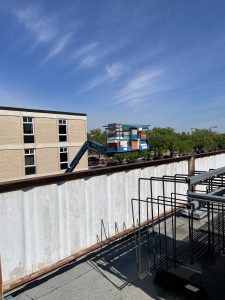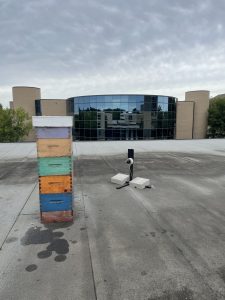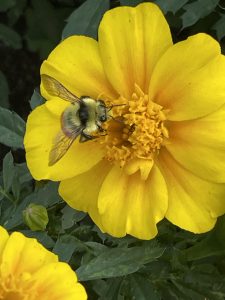Bee safe

Lifting up equipment at the start of the season.
The roof of Harvest Hall at BU is an ideal location for a small number of hives. Located near the middle of campus, it is at least a full city block away from the closest residences, and off the ground, which encourages bees to be well dispersed before they would come into contact with people.
Because the roof is flat, and the hives can be located far from the edges, it is safe to walk on. Access to the hives will be limited to authorized personnel. The exhaust fans on the roof should not bother the bees, and bees also cannot get into the building through the fans. The roof is low enough that the bees should not have difficulty leaving the hive to forage, but it is high enough that the hives should be safe from vandalism or tampering.

A view of the library windows.
Moreover, the roof of Harvest Hall is completely visible from the Solarium on the second floor of the John E. Robbins Library, which means that anyone would be able to view the hives.
Some people have concerns and questions about beehives at BU. Here are some of the common questions we’ve received, and all that we’ve done to make sure that the bees and our neighbours are safe:
Will this mean there will be too many bees in Brandon?
There are already a lot of bees in Brandon — including orange-belted bumblebees, green sweat bees, and leafcutter bees as well as honeybees. Four new hives are not expected to make any noticeable difference to the number of bees in the area.
Will the honeybees find enough food and water in Brandon?
Yes. Honeybees have a large foraging area and will be able to find pollen and nectar in personal and community gardens around the City. Bees can fly up to 5 km away from their hive while looking for pollen!
Brandon University already has a number of large flower and vegetable gardens, and the nearby Daly House Museum even has a dedicated “pollinator garden” on its grounds. We will install a catch basin on the roof of Harvest Hall to ensure that the honeybees have a consistent water supply.
Will the honeybees be aggressive?
Honeybees are not aggressive when foraging, and they regularly forage in a 5 km radius from the hives. Honeybees, unlike wasps, are not usually attracted to food and drink. A honeybee will usually only sting in self-defense or to protect the hive, so the location of the hives on the roof of Harvest Hall should greatly reduce the risk of stinging.
Will the bees swarm?
Honeybees swarm when a large number of them leave the hive with the queen, looking for a new home. Swarming is possible, but swarms are not aggressive and can be relocated by a beekeeper.
What about allergic reactions?
Honeybee hives at Brandon University will not increase the number of bees in the City of Brandon by a noticeable amount. The City is already home to countless native bees such as bumblebees, mason bees, and leafcutter bees. Those with severe allergies to bee stings should take precautions when outdoors.
What about mosquito fogging?
Fogging for nuisance mosquitoes occurs after 10 pm, which is when most bees have returned to their hives. The risk to honeybees is therefore low.
Will honeybees endanger native bee species?
As urban beekeeping becomes more prevalent and popular (it is currently permitted in such cities as Winnipeg, Vancouver, Calgary, Edmonton, Saskatoon, and Toronto), some researchers have raised concerns about the effect of urban beekeeping on native bee populations. A number of studies are being carried out around the world to understand the potential risks and rewards of beekeeping in cities.
The Bee U Committee would be happy to partner with researchers studying urban beekeeping. Moreover, we are placing the maximum number of hives at Brandon University at four (plus a nucleus hive) to ensure that honeybees do not outcompete native bees for pollen resources.

A native bumblebee on a flower at BU.
